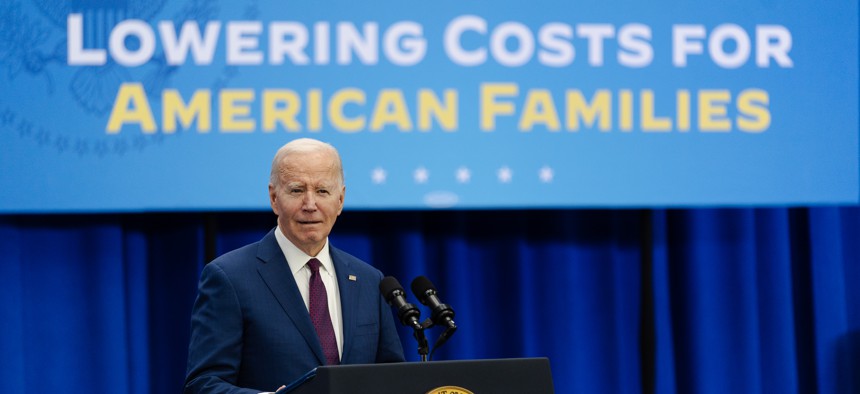Housing gets big boost in Biden budget

President Joe Biden speaks during an event about lowering costs for American families on March 11, 2024, in Goffstown, New Hampshire. Sophie Park/ Getty Images
The president is proposing funds to increase tax credits, support construction of affordable housing and reduce homelessness.
President Joe Biden on Monday proposed spending billions of dollars more to increase housing and to reduce homelessness as part of his $7.3 trillion spending plan for the next fiscal year.
Biden’s 1,298-page proposal addresses a wide range of issues, including a number of programs to help cities and states ease the housing crisis.
As he told officials at the National League of Cities conference in Washington shortly after his proposals were made public, “the cost of housing is critical to families nationwide. If inflation keeps coming down, mortgage rates are going to continue to come down as well. But I’m not waiting.”
Biden’s proposal would increase the low-income housing tax credit for states. According to a White House fact sheet, the increase would allow states to build or preserve an additional 1.2 million affordable rental units.
Biden is also asking for $1.3 billion in HOME Investment Partnership grants for states to build more affordable housing. The amount would be a slight increase over the $1.25 billion the program is receiving in the current fiscal year under the six spending bills Congress passed last week. Biden’s proposal, though, would not fully replace the funds Congress cut from the $1.5 billion it received last year.
However, Biden is proposing a new $20 billion competitive grant program for municipalities. Called the Innovation Fund for Housing Expansion program, it would, according to the budget proposal, give “flexible grants to local governments and other eligible entities to eliminate local housing supply gaps and lower housing costs.”
Biden told city officials the program will “help communities like yours build housing, renovate housing and convert empty office space and hotels into housing ... for renters, for owners, for middle-class families and folks struggling just to get by.”
In addition, Biden is proposing to create project-based rental assistance contracts that will provide $7.5 billion to incentivize the development of new climate-resilient affordable housing.
Addressing the nation’s housing crisis was also among the key issues in Biden’s State of the Union address last Thursday. He urged Congress: “Now pass my plan and build and renovate 2 million affordable homes and bring those rents down.”
The National Council of State Housing Agencies did not speak to Monday’s proposal, but it backed the concepts Biden mentioned in the State of the Union address. The ideas “reflect a comprehensive approach for addressing a multifaceted crisis: incentives for apartment construction, home sales and home buying; resources to local communities for reducing regulatory development; and assistance to economically vulnerable renters,” the council said in a statement.
House Republican leaders including Speaker Mike Johnson immediately condemned the proposal.
“The price tag of President Biden’s proposed budget is yet another glaring reminder of this administration’s insatiable appetite for reckless spending and the Democrats’ disregard for fiscal responsibility,” they said. “While hard working Americans struggle with crushing inflation and mounting national debt, the President would increase their pain to spend trillions of additional taxpayer dollars to advance his left-wing agenda.”
How much of the new White House budget House Republicans are willing to accept is highly uncertain. Lawmakers are still working to agree on a second set of six spending bills by March 22 for the current fiscal year that started six months ago. House Republicans have so far only agreed to a deal that keeps the current year’s spending at roughly the same levels as last year.
In addition to proposing to build more affordable housing, Biden is also asking Congress to take several measures to reduce homelessness. To help more low-income people pay their rent, the president’s budget would increase spending for Housing Choice or so-called Section-8 vouchers by $2.5 billion to help more low-income people pay their rent.
Biden would also spend $9 billion on a new program to help all of the 20,000 youths who will be aging out of foster care to pay their rent next year. Another $13 billion would go toward rental assistance for nearly 400,000 low-income veterans.
Plus, Biden proposed increasing funding for Homeless Assistance Grants by $427 million. According to the fact sheet, the increase would help an additional 25,000 people by providing emergency and transitional housing.
The White House also put forward a number of changes to allow more lower income people to buy homes. The president proposed middle-class homeowners still owning their starter homes a $10,000 tax credit to help them buy their next home. The proposal would also provide $10 billion in downpayment assistance to help those who would be the first in their families to buy a home. Middle-class homeowners struggling to pay their mortgages would also receive $10,000 in relief over two years.
“I’m not waiting” for mortgage rates to drop, Biden told city officials. “I want to provide an annual tax credit that will give Americans $400 a month for the next two years as mortgage rates come down to put toward their mortgages when they buy their first home or trade up for a little more space.”
Kery Murakami is a senior reporter for Route Fifty, covering Congress and federal policy. He can be reached at kmurakami@govexec.com. Follow @Kery_Murakami
NEXT STORY: Biden administration explores using Tesla-style tech in federally funded EV chargers






